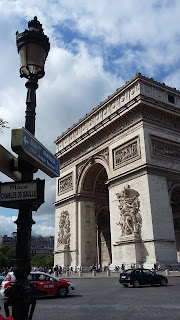“Look to see, to
remember, to enjoy.” That's what my art teacher used to say, and
it's one of the few things that has stuck from my schooldays. Easy to
say, hard to do. But I had a lot of practice this weekend as my old
art school buddy and her family visited us in Paris. She had never
been to Europe. On Friday, I played hooky from work and was their
tour guide for the day--Aug. 27, 2015.
With only two days
in Paris to work with, I devoted Friday to the right bank. We would
take the parade route from the Arc de Triomphe to place de la
Concorde, and then the royal road from the Tuileries Gardens to the
Louvre. And finish at ground zero, Ile de la Cité,
where Paris was born, the site since the first stone was laid in 1163
of Notre Dame cathedral (it was finished in 1330).
 The line being too
long, we gave up going to the top of the Arc and instead marched down
the Champs-Elysées. We
pretended that we were Gen. Charles de Gaulle and the American GIs,
who marched down the “most beautiful street in the world” 71
years ago almost to the day. Or days, I should say. For political
reasons De Gaulle staged a French march on Aug. 26. The GIs marched
on Aug. 29.
The line being too
long, we gave up going to the top of the Arc and instead marched down
the Champs-Elysées. We
pretended that we were Gen. Charles de Gaulle and the American GIs,
who marched down the “most beautiful street in the world” 71
years ago almost to the day. Or days, I should say. For political
reasons De Gaulle staged a French march on Aug. 26. The GIs marched
on Aug. 29.
The daughter, 19 and
a history buff, peppered me with questions. Asking me about the
origins of the Arc, I responded: “Ah ... Napoleon.” What a cheat.
I been around the memorial probably 1,000 times in my 20-year history
in Paris, and that's all I could say? I've seen the memorial, enjoyed
it, but was having a major senior moment. (If memory now serves me,
Napoleon in 1805 after his greatest victory, the Battle of
Austerlitz, promised his troops, “You shall go home beneath
triumphal arches.” That didn't happen. Louis Philippe had the Arc
finished in 1836.)
I was a good enough
host, but failing as an audioguide.
Paris never looked
better than on Friday. After shaking off a cold snap, the sun shone
with only a streak or two of cloud, and with a sharpness and clarity
that artists crave. One of the three main reasons it's known as The
City Of Light. (The others being the Enlightenment, and the early of
use gas-fueled street lights in the 1860s.) My friend and I no longer
drew to see, but instead used our cameras.
It was our way to
capture those brilliant rays with an 11 a.m. slant that made the
muscles bulge on the arch's bas relief's panels. That showed off the
blades and leaves of the greenery gracing the Rond Point. That failed
to capture the full height of an immense statue of the General
himself, in midstride on his famous walk down the Champs. The man was
6 feet, 5 inches, and in his day larger than most French life.
On the base of the
statue, one of his most famous epitaphs: “Paris! Paris outraged!
Paris broken! Paris martyred! But Paris liberated!” In old photos
of that day in 1944, the sun shone with the same brilliance. I
imagine the G.I.s were as sweaty and heavy footed as we were in the
full sun. What was next for them was one big party. What was next for
us was the taking on the Louvre.
It was a plaisir,
as the French might say, to walk in the footsteps of kings, the
embattled, and the liberators. To stroll in the past with each other,
and in the present with our families. Living here, I really don't
like what is usually Gray Paree every moment of the year. But I
really love Paris during these moments, with people I love, looking
back, going forward. Looking. Seeing. Remembering. Enjoying.

